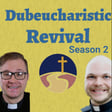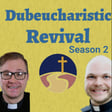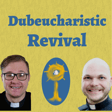
17: Eucharist in Film – with Bishop Elect Scott Bullock
Movies are just for entertainment, right? How can filmmaking and film viewing be an art form? Is art good? Movies are a big part of our culture and world, and art is a powerful force. Bishop Elect Father Scott Bullock discusses not what movies you should or should not watch, but instead how to see filmmaking as an art form which can lead us to contemplate and discuss the mysteries of the Divine Artist, our Almighty God.
The films and artists referenced can be found here:
Henri Bresson (France)
Yasujirō Ozu (Japan)
Harold Lloyd (United States)
The Last Temptation of Christ (Martin Scorsese, 1988)
The Trip To Bountiful (Peter Masterson, 1985)
Romero (John Duigan, 1989)
Flannery O’Connor
Babette's Feast (1987, Gabriel Axel)
Kid Brother (Harold Lloyd, 1927)
The Passion of Joan of Arc (Carl Theodor Dreyer, 1929)
The Passion of the Christ (Mel Gibson, 2004)
https://dbqarch.org/archdiocesan-eucharistic-revival




